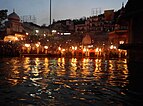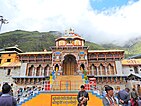
Back Uttarakhand ACE ኡተራኸንድ AM उत्तराखण्ड ANP أوتاراخند Arabic اوتاراخند ARZ উত্তৰাখণ্ড AS Uttarakhand AST उत्तराखण्ड AWA Uttarakhand AZ اوتاراکند AZB
Uttarakhand | |
|---|---|
| State of Uttarakhand | |
| Etymology: Northern Land | |
| Nickname: "Devbhumi" (Land of Gods) | |
| Motto: Satyameva Jayate (Truth alone triumphs) | |
| Anthem: Uttarakhand Devbhumi Matribhumi ("Uttarakhand, Land of the Gods, O Motherland!")[1] | |
 Location of Uttarakhand in India | |
| Coordinates: 30°20′N 78°04′E / 30.33°N 78.06°E | |
| Country | |
| Region | North India |
| Before was | Part of Uttar Pradesh |
| As state | 9 November 2000 |
| Formation (by bifurcation) | 9 November 2000 |
| Capital | Bhararisain Dehradun (winter) |
| Largest city | Dehradun |
| Districts | 13 |
| Government | |
| • Body | Government of Uttarakhand |
| • Governor | Gurmit Singh |
| • Chief minister | Pushkar Singh Dhami[2] (BJP) |
| State Legislature | Unicameral |
| • Assembly | Uttarakhand Legislative Assembly (70 seats) |
| National Parliament | Parliament of India |
| • Rajya Sabha | 3 seats |
| • Lok Sabha | 5 seats |
| High Court | Uttarakhand High Court |
| Area | |
• Total | 53,483 km2 (20,650 sq mi) |
| • Rank | 19th |
| Dimensions | |
| • Length | 320 km (200 mi) |
| • Width | 385 km (239 mi) |
| Highest elevation | 7,816 m (25,643 ft) |
| Lowest elevation | 187 m (614 ft) |
| Population (2011) | |
• Total | |
| • Rank | 21st |
| • Density | 189/km2 (490/sq mi) |
| • Urban | 30.23% |
| • Rural | 69.77% |
| Demonyms | Uttarakhandi |
| Language | |
| • Official | Hindi[3] |
| • Additional official | Sanskrit[4][5] |
| • Official script | Devanagari script |
| GDP | |
| • Total (2024–2025) | |
| • Rank | 20th |
| • Per capita | |
| Time zone | UTC+05:30 (IST) |
| ISO 3166 code | IN-UK[8] |
| Vehicle registration | UK |
| HDI (2022) | |
| Literacy (2011) | |
| Sex ratio (2011) | 963♀/1000 ♂[10] (4th) |
| Website | uk |
| Symbols of Uttarakhand | |
 | |
| Song | Uttarakhand Devbhumi Matribhumi ("Uttarakhand, Land of the Gods, O Motherland!")[1] |
| Foundation day | Uttarakhand Day |
| Bird | Himalayan monal |
| Butterfly | West Himalayan Common Peacock[14][15] |
| Fish | Golden Mahseer[12][13] |
| Flower | Brahma Kamal[16] |
| Mammal | Alpine musk deer[11] |
| Tree | Burans |
| State highway mark | |
 | |
| State highway of Uttarakhand | |
| List of Indian state symbols | |
Uttarakhand (English: /ˈʊtərɑːkʌnd/,[19] /ˌʊtərəˈkʌnd/[20] or /ˌʊtəˈrækənd/;[21] Hindi: [ˈʊtːərɑːkʰəɳɖ], lit. 'Northern Land'), formerly known as Uttaranchal (English: /ˌʊtəˈræntʃʌl/; the official name until 2007),[22] is a state in northern India. The state is bordered by Himachal Pradesh to the northwest, Tibet to the north, Nepal to the east, Uttar Pradesh to the south and southeast, with a small part touching Haryana in the west. Uttarakhand has a total area of 53,483 km2 (20,650 sq mi), equal to 1.6% of the total area of India. Dehradun serves as the state capital, with Nainital being the judicial capital. The state is divided into two divisions, Garhwal and Kumaon, with a total of 13 districts. The forest cover in the state is 45.4% of the state's geographical area. The cultivable area is 16% of the total geographical area. The two major rivers of the state, the Ganges and its tributary Yamuna, originate from the Gangotri and Yamunotri glaciers respectively.
Uttarakhand's history dates back to prehistoric times, with archaeological evidence showcasing human habitation. It was part of the ancient Kuru and the Panchal kingdoms during the Vedic age, and later saw the rise of dynasties like the Kunindas and influence of Buddhism as evidenced by Ashokan edicts. Though primarily driven by agriculture and hydropower, the state's economy is now dominated by the service industry. The service sector comprises primarily travel, tourism, and hotel industry. The Gross State Domestic Product (GSDP) of Uttarakhand is ₹2.87 lakh crore (US$34 billion). The state contributes five seats to the lower house Lok Sabha and three seats to the upper house Rajya Sabha.
Inhabitants of the state are called either Garhwali or Kumaoni depending on their region of origin. Hinduism is practiced by more than three-fourths of the population, with Islam being the next-largest religious group. Hindi is the most widely spoken language and is also the official language of the state, along with native regional languages include Garhwali, Jaunsari, Gurjari and Kumaoni. The state is often referred to as the "Devbhumi" (lit. 'Land of the Gods'), due to its religious significance and numerous Hindu temples and pilgrimage centres found throughout the state. Along with several historical, natural and religious tourist destinations, including Char Dham, Haridwar, Rishikesh, Panch Kedar, Himalayas, and Sapta Badri. Uttarakhand is also home to two World Heritage sites.
- ^ "Now Uttarakhand Will Sing Its Own Official Song". The Times of India. 6 February 2016. Archived from the original on 26 October 2020. Retrieved 12 November 2018.
- ^ "Pushkar Singh Dhami: BJP's Pushkar Singh Dhami to be next Uttarakhand chief minister". 4 July 2021. Archived from the original on 2 October 2022. Retrieved 4 July 2021.
- ^ Cite error: The named reference
2011langwas invoked but never defined (see the help page). - ^ Trivedi, Anupam (19 January 2010). "Sanskrit is second official language in Uttarakhand". Hindustan Times. Archived from the original on 1 February 2012. Retrieved 30 August 2017.
- ^ "Sanskrit second official language of Uttarakhand". The Hindu. 21 January 2010. Archived from the original on 3 March 2018. Retrieved 30 August 2017.
- ^ "MOSPI Gross State Domestic Product". Ministry of Statistics and Program Implementation, Government of India. 1 August 2019. Archived from the original on 26 April 2015. Retrieved 16 September 2019.
- ^ "GDP per capita of Indian states - StatisticsTimes.com". statisticstimes.com. Archived from the original on 3 June 2021. Retrieved 17 April 2021.
- ^ "Standard: ISO 3166 — Codes for the representation of names of countries and their subdivisions". Archived from the original on 17 June 2016. Retrieved 24 November 2023.
- ^ "Sub-national HDI – Area Database". Global Data Lab. Institute for Management Research, Radboud University. Archived from the original on 23 September 2018. Retrieved 25 September 2018.
- ^ a b "Census 2011 (Final Data) – Demographic details, Literate Population (Total, Rural & Urban)" (PDF). planningcommission.gov.in. Planning Commission, Government of India. p. 4. Archived from the original (PDF) on 27 January 2018. Retrieved 3 October 2018.
- ^ "State Symbols of Uttarakhand". Garhwal Mandal Vikas Nigam Limited. Archived from the original on 15 July 2013. Retrieved 1 April 2012.
- ^ "State Fishes of India" (PDF). National Fisheries Development Board, Government of India. Archived (PDF) from the original on 10 October 2020. Retrieved 26 August 2020.
- ^ Sharma, Nihi (1 December 2017). "To protect the endangered 'mahaseer' fish, Uttarakhand set to rope in fishermen". Hindustan Times. Archived from the original on 10 October 2020. Retrieved 26 August 2020.
- ^ "Common Peacock Male Papilio Bianor Polyctor". Archived from the original on 8 January 2017. Retrieved 7 January 2017.
- ^ "Uttarakhand To Declare Common Peacock As State Butterfly". 18 November 2016. Archived from the original on 2 January 2017. Retrieved 9 January 2017.
- ^ "Uttarakhand State Signs | Uttarakhand State Tree". uttaraguide.com. 2012. Archived from the original on 7 November 2012. Retrieved 8 October 2012.
State Flower : Brahma Kamal
- ^ Asian News International (16 June 2019). "Nanda Devi: Operation to retrieve bodies of missing mountaineers hampered by bad weather". India Today. Archived from the original on 2 October 2022. Retrieved 12 August 2019.
- ^ "Ichthyofaunal Diversity of Sharda Sagar Reservoir in Tarai Region" (PDF). Open Academics Journal Index. Archived from the original on 17 October 2021. Retrieved 9 September 2019.
- ^ "Uttarakhand". Lexico UK English Dictionary. Oxford University Press. Archived from the original on 16 May 2021.
- ^ "Define Uttarakhand at Dictionary.com". Dictionary.com. Archived from the original on 22 September 2013. Retrieved 27 August 2013.
- ^ "Definition of 'Uttarakhand'". Collins English Dictionary. Archived from the original on 9 February 2023. Retrieved 16 May 2021.
- ^ "Definition of 'Uttaranchal'". Collins English Dictionary. Archived from the original on 30 July 2016. Retrieved 16 May 2021.






